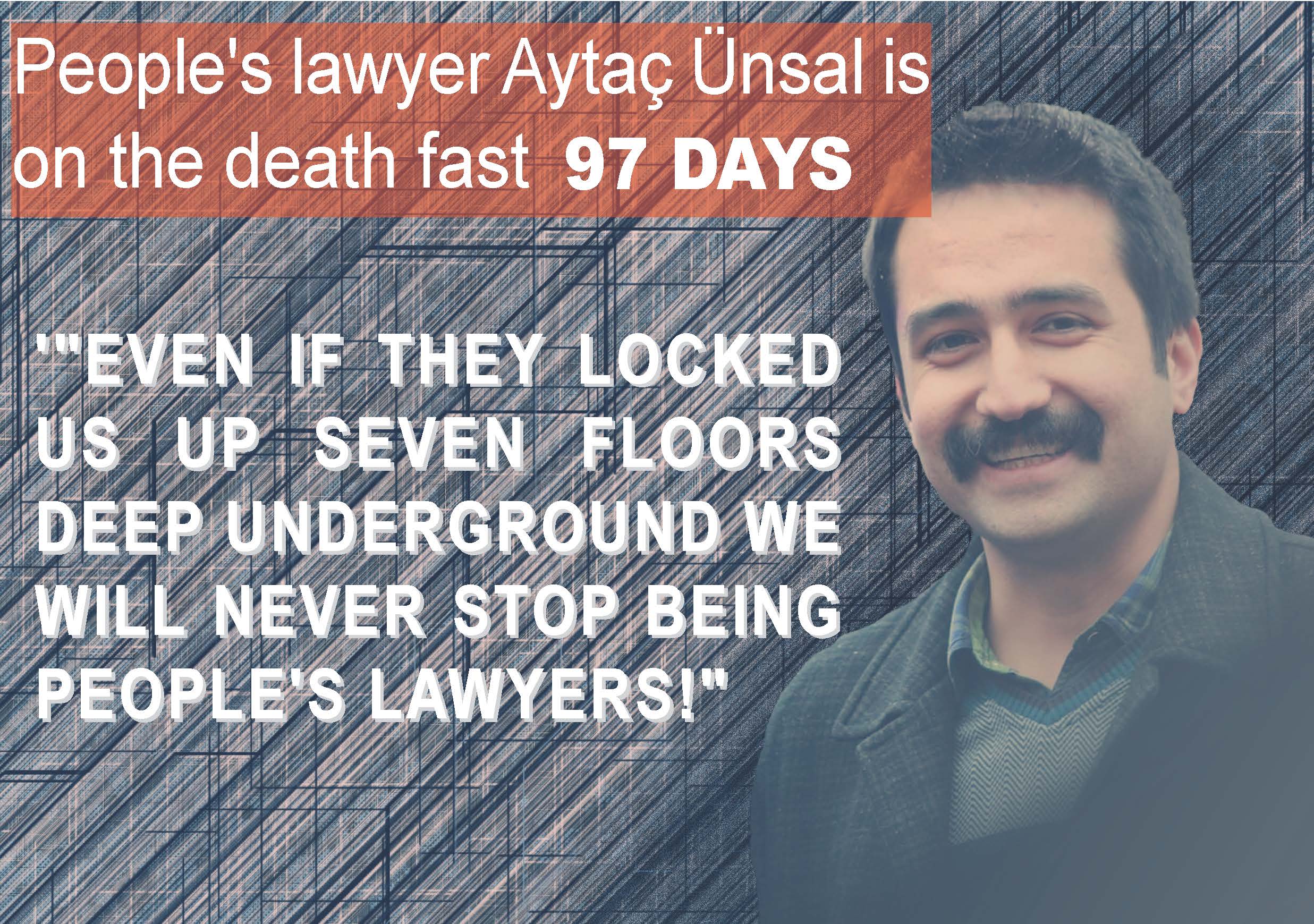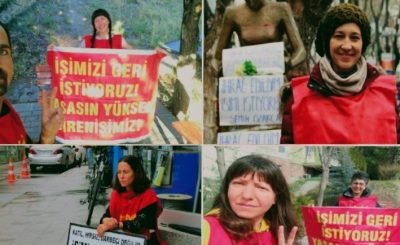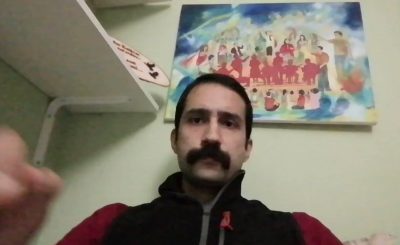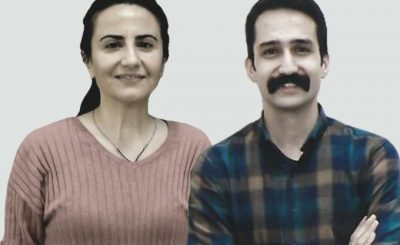To defend the women whose babies were orphaned after Soma, their parents who had no shoes on their feet and buried their children in the mud in Ermenek, it was like to defend Mehmet in primary school to defend Berkin Elvan, Hasan Ferit Gedik, Dilek Dogan, Sila Abalay. And I never left those Mehmets vulnerable. I lived the happiest times of my life while defending my people. While defending life and people, I got to know life and people. – Aytaç Ünsal
“I am sending this letter to you
Without adding anything
But my heart”
Nazim Hikmet
Hello!
How are you doing?, I wanted to tell you about myself. I thought you would like to know a lawyer who is on a death fast. In this story there are the reasons for why a lawyer is walking to death. And actually this is the story of all of us.
I am the only son of a civil servant family, but also the only child. Being a child of civil servants means not only being from anywhere but also being from Anatolia. Because the place where you were born is different, the place where you grow and know yourself is different. It was the same for me.
My mother is from Denizli Acıpayam and my father is from Adana Kozan. But I was born in Antakya and my midwife was Arab. I am the son of a mother who is judge. To be aware of the judicial mechanism can be thought of as teaching people Rights, Law and justice since childhood. Yet it has made me recognise injustice from childhood. Even in my childhood the class differences were embodied in my eyes. My father was a forestry engineer. We stayed in the lodgings of the Forest Directorates many times.
I was very young in Antakya. But the life of the people was in front of me with all its nudity. From time to time, a young girl named Zeliha came to look after me in the lodge we stayed at. She was making money by looking after me and helping my mum. She was a daughter of Nusayri poor family. She spoke Turkish with a beautiful Arabic accent. Zeliha, who has not yet known life, was learning the life with me. And I witnessed Zeliha’s poverty that had to wear my mother’s old clothes.
There was the son of a forest worker staying in the same building as us. His name is Mustafa. His the same age as me but not like me. Because I can’t go out without anyone around me, but Mustafa is on the streets. I have a tricycle, but Mustafa runs on stony roads. And bare foot. And Mustafa is always hungry, unlike me. I witnessed the hunger of a 4-5 year old boy running on the stone roads bare foot. And thats when it was the first time I learned to share my boiled eggs with him regularly.
Our next stop was Bayramiç, the small and charming district of Çanakkale. Bayramiç was the paradise of the homeland. Just like Antakya, it was the richness of Anatolia. The Gypsy people and the Turkish people lived together. There was also a young girl here who was taking care of me and helping out clean the house. This time her name was Berna. And this time she was not a Nusayri but a Gypsy. But it was the same poverty, and the same work. This time, my playmate was Ismail, the son of a Turkish Sunni Islamist family. I had other friends that I visited frequently. Workers working in the Forest Enterprise used to set up barbecues next to their shelters on lunch breaks and make “shit fish.” The people in Çanakkale name the sardine fish that because its cooked without cleaning it. Of course, once I’ve smelt it with my five senses that the grill was set up, I’d start walking around like a cat in front of a butcher shop. They’d notice me and call me over right away. And after a while I became a member of this humble barbecue party. I learnt the naturalness, the sincerity, the warmth among those people. After Çanakkale, we set out to the inner Aegean. We were at Uşak. I started primary school now. And my testimonies continued to increase. In elementary school, I personally experienced the favoritism of bureaucratic civil servant children like us. My best friend Yavuz who is from Konya was a child of a worker. The majority of the school consisted of these worker and farmer children. We were the same with them, but we were not like each other. I had a friend named Mehmet who was studying in another class. His apron was patched. The collar looked like the collar of female students. Since he could not get pocket money from his family, he could not buy bagels during the break. When I saw this, I cried to my mother when I returned home. And I asked, “Why? Why is he like that? ”. Because these things did not comply with the right measures in the stories of Ömer Seyfettin, such as Diet, Gönen, which my mother read to me.
My mum tried to explain. And she advised, “You can buy a bagel ayran too.” One day, one of the school’s rogue children began to humiliate and annoy Mehmet. I got crazy. I dropped him on the ground and started kicking him. It was like I was asking for an account of what Mehmet was going through. I wasn’t stopping, I was emptying my anger. They barely took him away from me. Then my teacher put me in front of the class and asked me what I’d done. “Why did you do it?” the teacher asked, “Cause his my brother” I said. The teacher knew I was the only child so she was shocked. “So what, is he named Mehmet ÜNSAL” she asked. I was so possessive that the teacher called my mother and asked, ” Does Aytaç have a brother?”. I did! He was my brother… thats where I witnessed a child’s bruise and my friend Yavuz’s musty-smelling workhouse in the basement.
Then we were in Izmir, where I stayed until university. These class differences in Izmir were more than I could ever imagine. The high school I went to was complicated. There were also children from wealthy families but it was largely a place where poor families children studied. Until I started high school, my best friends in Izmir were the children of the doorman of the building. I was always at their house, and they were often at our house. I always felt more comfortable there, with the workers, with the people. I was overwhelmed by the austere, primitive individualism, pretension among the rich. I experienced it many times in high school.
I was raised in a Turkish Sunni family. The influence of the MHP (Nationalist Movement Party) was intense in Kozan, especially on the father’s side. My mothers dad, my grandpa was a fan of Süleyman Demirel. Even though I wasn’t a political person, I’ve never seen anything quite right except this reality. I had an incident in high school that made me question all that. I had a classmate named Yusuf he was Kurdish from Mardin. A teacher in our History class asked Yusuf to stand up “tell me Yusuf are you Arabic? Are you Kurdish? Or are you Turkish?” the teacher asked. When Yusuf said “ I’m Kurdish”, the teacher said “you failed from my lesson!”. I was shocked. What was this now?. Thats when I faced the truth of our country , in high school. I faced the reality of my friends who stayed in the dorm, who had to walk miles to school every day because they didn’t have enough money, which is why they were napping in class. I saw it in the reality of families trying to survive on a single salary and having to eat pasta rice every day.
When I went to Ankara to study at University, most of the students in law school were children of wealthy families. They were far away from the truth of the millions. You know, in Turkish movies, when they say were people of other worlds it was that. Their order of the day and their problems were different. I wasn’t comfortable and I wasn’t happy. I was used to the relationship of my people, open, sincere, warm, accepting the “right and right” as a child, knowing how to laugh, being there with a shoulder in a difficult time. I was looking for Zeliha, Mustafa, Berna, Ismail, Mehmet, Yavuz, Yusuf. I felt like they suddenly disappeared.
Then I got to know People’s Law Office. And I realized that they are actually everywhere. And their millions of millions. I found them again. I found them in the resistance of Cansel Malatyalı which I participated in. I got to know them with the Kazova workers. I saw them in the Kınıklı mine workers. I found them in Didem, my dear wife, a lawyer of the People’s Law Firm. After finding them once again, I never left them alone. To defend the women whose babies were orphaned after Soma, their parents who had no shoes on their feet and buried their children in the mud in Ermenek, it was like to defend Mehmet in primary school to defend Berkin Elvan, Hasan Ferit Gedik, Dilek Dogan, Sila Abalay. And I never left those Mehmets vulnerable. lived the happiest times of my life while defending my people. While defending life and people, I got to know life and people. In my childhood, I learned life from Zeliha, Mustafa, Mehmet, and workers. People’s Law Office taught me life in real terms. Kınıklı workers, Kazova workers, Cansel Malatyalı, Türkan Albayrak, TAYAD members who resist everywhere, free prisoners, master at loving revolutionaries, my clients who are too many to name here, my wife, love, Didem have taught me what it really is to live. I have lived loyalty, solidarity, sharing, love and trust into my bones. And I can say “I lived” with great ease.
Now they’re forcing me to give up all this. They say you can’t defend the workers, the villagers, the people of Anatolia. They say you can’t be a lawyer at the people’s Law Firm. They say you can’t see Didem for the next 10.5 years. They’re trying to put a ban on the people, the country, to my love, to my profession. But these are not worthless things that you can just give up. It’s not simple enough to say,” Well, there’s nothing to do.” I never give up my people, Anatolia, who taught me life, who made me human with their effort. I will die but not give up.
This is the story of my journey. Mustafa, who was in my life yesterday, still exists today. Now, the Kırıklar No. 1 F-Type Prison is coming to its 300’s days. Resisting to death like Koçak. Mehmet who cannot eat bagels is İbrahim Gökçek who is 30 kilos today. And I have been family since their childhood. And I have been a their lawyer since childhood. I will die, but I will not stop defending them!




